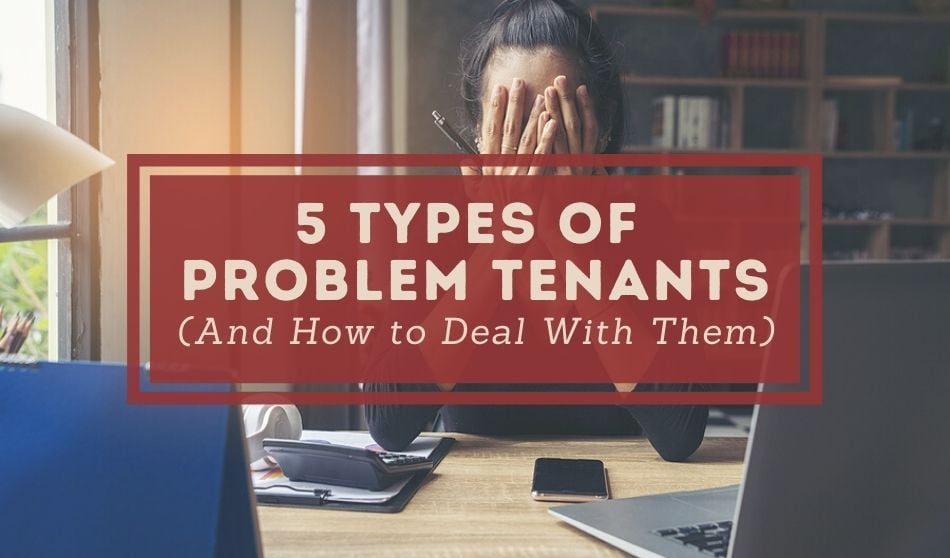Property management requires a lot of know-how and experience, especially when it comes to the less enviable aspects of the job.
Not only is it important to know how to keep good tenants happy, but knowing how to deal with problem tenants is one of the most essential skills to have here. There will always be some tenants that never seem to be satisfied or turn out to be outright troublemakers after signing the lease agreement.
Of course, a thorough screening system can help to filter out the majority of problem tenants. While this does help, there are always unforeseen circumstances that might hit at any time.
A security deposit helps in such cases; however, the first order of business is to check out the main types of problematic tenants. Let’s begin looking at these categories first, and then, seeing if there’s an overreaching solution for dealing with these cases:
How to Deal With Problem Tenants
Dealing with tenants who have certain issues can take some time. Since a manager should always be prepared, you’d do well to look up the different types of problem tenants and how one can find solutions to their issues. The following categories apply to single-family rental homes, for the most part, but some property managers might also use them on mobile homes for sale or any other type of lease:
1. Late Payers or Partial Payers
One of the most common issues that property managers face is related to rent payments. Make it clear within the lease that late payments aren’t tolerated. Even with this expectation and a solid security deposit, there might still be late, partial, or even nonexistent rent payments from time to time.
In these situations, be firm. Your lease should indicate what action will be taken. Most landlords will impose a late fee as a penalty for the late rent (this must be indicated in the lease agreement). Late fees for rent payments are typically based on a reasonable percentage of the monthly rental rate (5-10%) or a flat fee.
If you notice a pattern in one of your tenant’s rent payments being consistently late, talk to them about it to find out if there’s a reasonable explanation (for example the rent’s due date and their payday do not line up ideally). Alternatively, can issue send a written “pay or quit” notice, telling the tenants that unless they pay the rent within the specified period of time, they must move out.
Important Note: Keep in mind that laws surrounding late fees and the eviction process have been altered during the pandemic. This can make it a tough topic to navigate for landlords and renters alike. For more information for your area, check with a legal advisor.
Discover more information related to the pandemic, and the eviction moratoriums:
- What the CDC Eviction Ban Means for Landlords and Tenants
- A Landlord’s Guide to Rent Collection | Late Payments and Past Rent Debt
2. Damaging DIYers
Another very common problem with tenants and renters is the matter of property damage. This includes unapproved improvements, negligence, and property abuse.
In the old days, property managers used to go through each rental unit holding a clipboard and pen to record all the issues among the tenants. Consider using an inspection application; these apps will cut your inspection time in half, and they also have a feature for taking pictures.
Taking pictures and videos will enable a property manager to archive ‘before’ pictures that they can use as proof for legal matters. You can also take current photos and upload pre-and-post tenancy photos to the inspection report. With this precaution, any kind of property damage will be apparent once you show the evidence at hand.
There might also be debate around the issues of unapproved improvements. These include painting, shelving, installing new fixtures, simply hammering in nails, depending on the terms of your property’s lease agreement. If the ‘upgrade’ isn’t attractive, you might ask the tenant to repaint or repair it when their lease is up or withhold part of their damage deposit to restore the unit to its original condition.
Before deducting from a tenant’s security deposit, or charging them for repairs, be sure you understand your state laws and local laws when it comes to security deposits. Additionally, verify that damage is more than regular wear and tear.
Regularly inspect your rental units. Your lease should state that this will occur with proper notice; this will allow you to notice unauthorized updates or general property abuse. Finally, if the tenant simply refuses to fix their damage and won’t pay for the repair cost either, you should have a clause about terminating the lease agreement. A ‘Cure or Quit’ notice is usually the one to include in the lease agreement beforehand.
3. Illegal Subletting
Subletting isn’t illegal per se. But it can be a lease-breaking activity if the landlord or property manager doesn’t allow it. Now that we have services like Airbnb, too many people are taking advantage by booking rentals and passing them on for short-term vacations to other people.
Some places might have a law against this practice. If the practice is legal in your property’s area, you don’t want multiple strangers will be using your property in a very short period of time. These guests would not face the same tenant screening with which you vet your renters.
The same goes for long-term guests, unapproved roommates, or general subletting. Speak to your legal advisor about adding a clause to your lease that prevents unauthorized subletting or unapproved long-term guests.
Learn more about the pros and cons of subleasing: A Landlord’s Guide to Subleasing
4. Expert Complainers
Tenants have all the right to complain if something isn’t working properly. But property managers should draw the line as soon as possible. If you’re not careful in setting limits, certain kinds of people are all too eager to place constant calls and send outrageous requests.
Prioritize your maintenance requests to use your time efficiently. Just a few examples include tenants asking to increase the amount of hot water, fix a sticking door, etc. Many tenants can DIY these minor issues.
If you think they’re taking advantage of your eagerness, remember that while your rental must be legally habitable, you don’t have any legal obligations to immediately attend to every small issue. Furthermore, when the time comes to offer renewal incentives, consider whether you truly would like to renew a lease with this type of tenant.
5. The Lawbreakers
There are many rules that one has to follow when they rent a property. Signing the lease on an apartment means that a tenant has to agree to abide by these rules or risk eviction.
One of the most commonly broken rules is a no pet policy. Tenants might try to make you feel guilty about not allowing a beloved pet in the rental units, but remember to apply the same rules to all tenants to ensure fairness. Keep in mind that service animals do not count as pets.
If your rental does allow pets, periodic inspections are necessary to ensure that they’re not causing damage. Pet rent and pet training documentation can also serve to mitigate risk when renting to pet owners.
There are several other types of lawbreakers that a property owner might encounter among their tenants. These include the ones who grow marijuana, sell drugs, use drugs, get drunk in public, or engaging in practices that are legally restricted in your area. If laws are being broken or you fear for your or other tenants’ safety, call the police. Remember that even if a tenant is arrested, their lease does not become automatically void. A good attorney will help you with filing an eviction.
Practical Tips for Dealing With Problem Tenants
Now that you’re familiar with the kind of problem tenants to look out for, it’s time to read up on how to deal with them. Here are a few more tips to get you through a rough patch:
1. Don’t overlook the importance of tenant screening, but do some extra research
Tenant screening can tell you a lot about a potential tenant. But it doesn’t account for several things. The financial conditions, personal situation, and emotional state of the tenant can lead to a lot of misunderstandings.
If you’re a landlord, start reviewing the most common kinds of problem tenants so that it would be easier to recognize them and take proper action before signing anything. Be sure to create legal written tenant screening criteria for your team, to ensure that you are evaluating each applicant with fair and unbiased criteria.
2. Dealing with damaged and unauthorized projects
Many tenants don’t care about the property as it’s not their own. Here are just a few ways to prevent tenants from wrecking the place with their indifference:
- Write the lease properly and clearly: Your biggest weapon against terrible tenants is the lease agreement between the two parties. Before anyone signs the document, make sure that it spells out all the expectations about maintenance. Be sure to go over the key lease points to ensure your tenants understand them.
- Have a very detailed inspection before they move in: Before you let any tenants move in, take photos or a video of each room from as many angles as possible. Date store these online. Photos will help you compare the condition of the property at the end of the lease term. This way, you can charge for all the damages in a legal manner.
- Perform routine inspections: Don’t just conduct inspections when the lease is up. Perform inspections seasonally or twice a year Inspect the unit and other parts of the property for any maintenance issues or the potential for damage. Review your pre-tenancy photos for comparison. Address the issues as soon as possible before more major damage occurs.
3. Serve notice and evict according to your state’s laws
If evicting is the only option left, be sure to document all aspects of the process and your reasons for evicting. For instance, many tenants might say that they never got the letter asking for payment. You can get around these potential issues by utilizing Certified Mail. If you are pursuing eviction, make certain that you or your property manager is following the process exactly. Otherwise, you risk delaying the process, potentially allowing a renter to continue living on his property rent-free. Additionally, if you take any illegal eviction steps, you could end up owing your renters money.
Learn more about the eviction process: How Long Does an Eviction Take?
The Takeaway
There are several factors to consider when it comes to dealing with problem tenants. With the guidelines above, you should be able to navigate the delicate issues and come out strong in the end.






